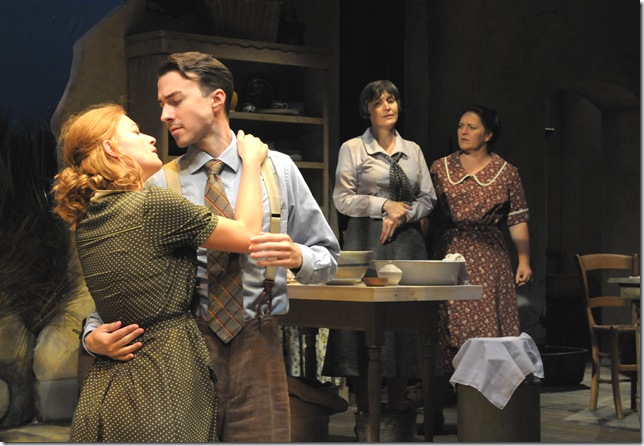When you are trying to capture audience attention and tell a complete story in about 10 minutes, you might as well stick to comedy. That is apparently the lesson that Miami’s City Theatre has learned in its 18 years of producing Summer Shorts, an annual seasonal festival of playlets that accentuates the humorous and occasionally the out-and-out wacky.
In recent years, Shorts has downsized from its double program length, which one could watch on separate nights or in one marathon viewing with a dinner break. The newest edition, now running at the Arsht Center’s Studio Theater through the end of June, consists of 11 skits which collectively form a satisfying smorgasbord. (As a remnant of the past format, I guess, the program insert lists the two halves of the evening as Program A and Program B, but feel free to think of them as what they really are — two acts.)
Over the years, Summer Shorts has drawn some of the region’s best performers, those who are game for the marathon, multi-character, quick-change experience. Not back this year is Steve Trovillion, who often dominated the theatrical event with his anything-goes comic abandon. He is missed, although his shoes are filled quite well by Ken Clement and Todd Allen Durkin, a pair of capable clowns who manage to elevate the material they deliver beyond what is on the written page.
Their zany touch is particularly evident in The Student by Matt Hoverman, in which Durkin plays an exceedingly odd, obsessive pupil of creative writing teacher Clement, who has just received another rejection letter for one of his short stories. In a more fanciful sketch, Rick Park’s Please Report Any Suspicious Activity, Clement and Rayner Garranchan are dolphins who hop aboard a subway and carry on an animated conversation, much to the astonishment of a nearby human passenger.
Clement never met an outlandish costume he didn’t like, and designer Ellis Tillman supplies some very amusing duds for him. In the evening’s finale, Mothra vs. the Casting Director: An Allegory, Clement plays the oversized, irradiated Japanese creature, now reduced to the indignities of auditioning for a follow-up movie role. The script by David Bar Katz does not go much beyond the initial nutty premise, but Clement sustains the scene’s comedy to the end.
Earlier in the second act, Clement donned the formalwear and fangs of a vampire, captured and caged by the wife (Vera Varlamov) of a blood-sucking lawyer. The scene is Bite Me by Nina Mansfield, but, ironically, it has little bite. The evening begins with a clever sketch called iZombie, which is not about the walking dead, but rather our slavish devotion to our smartphones. Varlanov and Garranchan meet and are attracted to each other, but find they cannot communicate without relying on their cells.
Paul Rudnick, a frequent contributor to Summer Shorts, is a master of the comic monologue, as he demonstrates with The Gay Agenda, a genteel rant by a Mary Abigail Carstairs-Sweetbuckle, a Midwestern housewife with definite opinions of same-sex marriage. Irene Adjan performs the piece with sly abandon. She teams with Durkin on a sketch called The Favor by Leslie Ayvazian, about a couple dealing with her dying mother, who has an unusual request for her son-in-law. The subject matter had the potential to be the one dramatic piece of the evening, but Durkin manages to mine it for laughs.
Susan Westfall, one of the co-founders of City Theatre, provides a cute play called Feel the Tango, in which the Argentine dance and a trio of aggressive waiters help to rekindle the romance for Adjan and Clement. And it wouldn’t feel like a complete Summer Shorts without a couple of how’d-they-make-the-cut head-scratchers. For what they are worth, Steve Yockey’s Serendipity and Sheri Wilner’s A Tall Order fill that role this year.
SUMMER SHORTS, City Theatre at the Arsht Center’s Carnival Studio Theater, 1300 Biscayne Blvd., Miami. Through Sunday, June 30. Tickets: $35-$40. Call (305) 949-6672.
* * *
Memory plays, those recollections of the theater artist as a young man, are a rich tradition of the stage. And in casting his mind back to his youth, to his days growing up among his unwed mother and her four impoverished, spinster sisters in Dancing at Lughnasa, Briel Friel created one of his richest, most evocative works.
The Tony Award-winning play caps the season for Palm Beach Dramaworks, which gives it an impressive, involving revival, thanks to the deft direction of J. Barry Lewis and a cohesive ensemble cast.
The Mundy women live a hardscrabble existence in the Irish village of Ballybeg, barely getting by on schoolteacher Kate’s salary and Aggie’s knitting. But young Michael, Friel’s fictional alter ego, has little idea how poor they are. To him, the most memorable things about that summer of 1936 were the arrival of the family’s first wireless radio — a notoriously unreliable appliance that is soon dubbed Marconi — and the return of his Uncle Jack, back from years of missionary work in a Ugandan leper colony.
The music from the radio provides the Mundys with what little happiness they have. Their thoughts often drift back to the days when they would dance at the local Festival of Lughnasa, a pagan harvest ritual they used to enjoy. But the notion of them going again is vetoed by Kate, the parental, eldest sister who forbids these Cinderellas from attending the ball.
Instead, they settle for Marconi, which comes to life and transmits a pounding Irish beat, and they too catch the spirit, kick up their heels and launch into a folk dance of complete abandon. They whoop, holler, strut and spin with spontaneous motion — choreographed by Lynnette Barkley — a bold theatrical stroke that disappears as abruptly as it arrived.
In contrast, most of the rest of the evening is pain and heartache. Economic downturns and industrial progress threaten their meager livelihood, glimmers of hope for romance will be dashed and concerns over simple-minded Rose and ailing, disoriented Uncle Jack will weigh on them all.
Meghan Moroney is particularly vivid as Maggie, the self-assigned cook, whose defense against their tough lot are the riddles and stories she clings to. Stern Kate (Julie Rowe) clutches instead to the strictures of Catholicism. Gretchen Porro’s Chris, Michael’s mom, lives for the rare visits by Gerry (a rakish Cliff Burgess) and for her Fred-and-Ginger fantasies, while Aggie (Margery Lowe) sits and knits, barely repressing her own feelings for Gerry.
Perhaps most heart-breaking is slow-witted, child-woman Rose (Erin Joy Schmidt), a bundle of vulnerability reaching out for love. While the play belongs to the women, John Leonard Thompson leaves a strong impression as Uncle Jack, struggling with his words and with re-emersion into Irish ways.
Dramaworks’ design team — Jeff Modereger (sets), Brian O’Keefe (costumes) and Ron Burns (lighting) — conveys the drab world of Dancing at Lughnasa with skill. Friel’s family album is full of dark tones, to be sure, but the cumulative effect is theater at its best, fueled by exquisite writing and performances that will linger with you.
DANCING AT LUGHNASA, Palm Beach Dramaworks, 201 Clematis St., West Palm Beach. Through Sunday, June 16. Tickets: $55. Call: (561) 514-4042.

